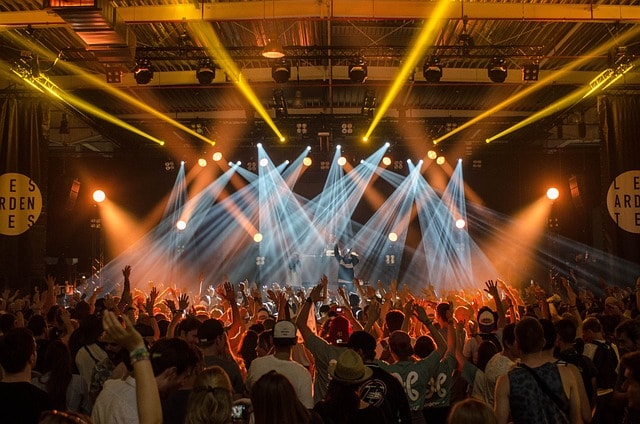Want to master sport and entertainment management? This article offers practical tips and strategies to excel in organizing sports and entertainment events. From budgeting and risk management to fan engagement, get insights into making your events unforgettable.
Table of Contents
Key Takeaways
Mastering sport and entertainment management requires strategic planning, effective budgeting, risk management, and post-event evaluation to ensure successful and memorable events.
Building long-term collaborations and leveraging digital platforms in partnerships enhances fan engagement and brand visibility, crucial for the modern sports and entertainment landscape.
Educational programs focusing on real-world experiences, internships, and industry networking are essential for equipping graduates with the necessary skills and insights for successful careers in sport and entertainment management.
Top Tips for Mastering Sport and Entertainment Management

Excelling in sport and entertainment management demands meticulous attention to detail and strategic planning. Organizing memorable sports events requires careful coordination across various aspects, from logistics to participant engagement. Effective event management guarantees a seamless experience for both spectators and participants, crucial for the event’s success.
Event planning heavily relies on effective budgeting. Wise allocation of funds across event components can spell the difference between a profitable venture and a financial disaster. Clear objectives set during the pre-event planning phase guide all subsequent decisions, ensuring alignment with the event’s intended goals. Risk management is another critical aspect that should not be overlooked. Thorough assessments and emergency protocols are vital for managing unexpected challenges during the event.
Stakeholder coordination on the event day is crucial for smooth operations. Post-event evaluations offer insights into successes and areas for improvement, fostering continuous enhancement in future events. Evaluating past events enables managers to refine strategies and improve planning processes, resulting in more successful events.
Introduction
The sport and entertainment industry has witnessed significant growth over the years, becoming a vital part of the global economy. This field encompasses the planning, organizing, and executing of events and programs across various platforms, offering diverse career opportunities for those passionate about sports and entertainment. The increasing popularity of these events has led to a rise in job opportunities, attracting individuals who are eager to engage and entertain audiences.
Success in sport and entertainment management demands a unique set of skills, including leadership, communication, and adaptability. These skills are vital for navigating the industry’s dynamic nature and adapting to changing trends.
Professionals managing sports teams, music festivals, or film premieres must possess the resources and insights to create unforgettable experiences for clients and audiences.
The Evolution of Sport and Entertainment Partnerships
The landscape of sport and entertainment partnerships has evolved dramatically over the years. Initially, partnerships were primarily focused on sponsorships and financial support. However, the scope has expanded to include collaborative efforts that enhance fan experiences and brand visibility. Event management is crucial in these partnerships, ensuring seamless execution for both participants and spectators.
Digital media and social media platforms have revolutionized how partnerships are formed and maintained. Partnerships now extend beyond traditional sports to include music, gaming, and film, offering diverse fan engagement opportunities. These collaborations benefit the brands involved and enrich the overall audience experience, making events more memorable and impactful.
Long-Term Collaborations with Major Sporting Events
Long-term collaborations with major sporting events demonstrate the enduring value of strategic partnerships. Coca-Cola’s relationship with the Olympic Games, which dates back to 1928, is a prime example of such a commitment. This longstanding partnership highlights the benefits of consistency and dedication in building brand loyalty and visibility.
Coca-Cola’s support for the FIFA Women’s World Cup since 1991 underscores its dedication to promoting women’s sports and fostering long-term collaborations.
The FIFA World Cup Trophy Tour by Coca-Cola, started in 2006, exemplifies how engaging with local businesses and leveraging social media can boost marketing efforts and fan engagement.
Supporting Inclusivity and Diversity in Sports
Inclusivity and diversity are vital in the sports industry, with initiatives like the Special Olympics leading the way in promoting these values. The Special Olympics advocates for the rights of individuals with intellectual disabilities, ensuring equal opportunities in sports and beyond. The Revolution is Inclusion campaign, launched in 2018, aims to eliminate discrimination and promote understanding and acceptance.
Unified Sports programs bring together athletes with and without intellectual disabilities, fostering mutual respect and breaking down stereotypes. The Special Olympics Unified Champion Schools program further promotes community inclusion by allowing students of varying intellectual abilities to learn and play together, reducing bullying and fostering a culture of inclusion.
Enhancing Fan Engagement Through Music, Gaming, and Movies

Incorporating music, gaming, and movies into sports events has proven to enhance fan engagement significantly. Partnerships in these areas create diverse, immersive experiences that resonate with fans on multiple levels. Engaging fans through entertainment content fulfills their desire for unique experiences and strengthens their connection to the event and the brands involved.
An active social media presence increases brand exposure and facilitates interaction with fans before, during, and after events. Short-form videos and user-generated content, like fan-created videos and athlete insights, significantly boost engagement by providing behind-the-scenes views and exclusive content.
Aligning marketing efforts with peak events or significant moments maximizes audience engagement and visibility.
Real-World Experience in Sport and Entertainment Management Programs
Educational programs in sport and entertainment management aim to provide students with practical, real-world experiences. These programs prepare individuals for diverse careers by covering essential skills such as business operations, revenue generation, marketing strategies, and legal considerations.
Graduates often pursue careers in various environments, including athletic departments, event venues, and player agencies.
Internships and Hands-On Opportunities
Internships and hands-on opportunities are essential for preparing students for careers in sport and entertainment management. The SPTE department provides valuable learning experiences through practicums and internships, empowering students with the real-world skills and networks crucial for industry success.
Learn more, visit the 4 Types of Sports Management Internships to Help Kick Off Your Career.
Industry Conferences and Networking
Industry conferences offer students and professionals insights into the latest trends and developments in sport and entertainment management. These events provide networking opportunities, fostering relationships that can lead to job opportunities and industry collaborations.
Workshops at these conferences also focus on essential skills like leadership, negotiation, and resume writing, enhancing career readiness.
Innovative Research and Insights
Research by faculty and institutions like the College Sport Research Institute and the Center for the Advancement of Sport and Entertainment focuses on pivotal industry topics. Topics include big data, sport law, ticket sales, fantasy sport, sport gambling, social media, and sustainability.
This research provides valuable insights that help shape the industry’s future and prepare the next generation of professionals.
Premier Sporting Events and Travel Management
Travel management significantly enhances the fan experience at major sporting events. Custom travel packages offer tailored services catering to individual preferences, providing exclusive amenities like VIP access and personalized itineraries.
These packages enhance the overall experience, ensuring fans leave with unforgettable memories of the events they attend.
Custom Travel Packages for Major Events
Custom travel packages for major sporting events offer unique experiences like VIP access, guided tours, and special events. These packages enhance fan experiences with exclusive amenities like sideline seats, five-star accommodations, and personal concierge services.
Fans enjoy behind-the-scenes experiences and celebratory meals, making their event attendance truly special.
Celebrating Milestones in Sports Travel
Significant anniversaries in the sports travel sector highlight advancements in travel logistics and fan engagement strategies. Reflecting on these milestones emphasizes the evolving role and contributions of sports travel management companies in promoting tourism and boosting local economies through major sporting events.
These companies have shaped the industry by innovating travel solutions and enriching the fan experience.
The Role of Marketing in Sport and Entertainment
Marketing is crucial for success in sport and entertainment management. Understanding the target audience through market research is key to creating effective marketing strategies that maximize engagement. Data-driven insights help tailor promotions to attract both new and returning fans, ensuring marketing efforts resonate with the intended audience.
Partnerships with sports figures and other brands can greatly enhance visibility and credibility in the market. Media coverage and targeted outreach to local publications build lasting relationships with audiences, promoting events and fostering community around sports teams or entertainment properties.
Aligning with major sporting events allows brands to positively influence their image and gain substantial exposure to diverse audiences.
Building Successful Sport and Entertainment Businesses
Establishing a clear purpose for each event is the foundation of building a successful sport and entertainment business, influencing all aspects of organization and execution. Creating a detailed list of all necessary components helps manage logistics and budget effectively, ensuring smooth event operations. Prioritizing event elements allows for more effective resource allocation and management.
Strong community relationships are essential, especially for events that may disrupt local routines. Creative sponsorship approaches can expand funding opportunities, and consulting legal experts ensures proper liability waivers and insurance for prizes and giveaways.
Recruiting volunteers can significantly reduce budget constraints and provide necessary resources and support for the event.
Leveraging Technology for Enhanced Fan Experiences
Technology is revolutionizing fan experiences in the sports and entertainment industry. Virtual reality (VR) experiences at sports events allow for immersive engagement, offering fans unique perspectives. The integration of video assistant referee (VAR) technology has significantly altered gameplay and fan enjoyment, enhancing the overall experience.
Fans now have access to in-stadium commentary and referee audio, enriching their live experience during events. These technological advancements create a more interactive and engaging environment, making sports and entertainment events more enjoyable and memorable for fans.
Summary
In summary, mastering sport and entertainment management involves a blend of strategic planning, effective marketing, and leveraging technology. The industry’s growth and evolution offer numerous opportunities for those passionate about creating memorable experiences and engaging diverse audiences. From long-term partnerships to innovative fan engagement strategies, the key to success lies in adaptability and continuous learning.
As the sport and entertainment industry continues to evolve, professionals must stay ahead of trends and embrace new technologies to enhance fan experiences. By fostering inclusivity, supporting diversity, and building strong community relationships, the future of sport and entertainment management looks bright and promising.
Frequently Asked Questions
What are the essential skills needed for a career in sport and entertainment management?
A successful career in sport and entertainment management requires strong leadership, effective communication, and adaptability to changing trends. Mastering these skills is essential for effectively navigating the industry’s dynamic environment.
How do partnerships enhance fan engagement in sports and entertainment?
Partnerships enhance fan engagement by creating diverse and immersive experiences that resonate with audiences. Collaborations with various industries fulfill fans’ desires for unique interactions, thereby strengthening their connection to events and brands.
What role does technology play in enhancing fan experiences?
Technology significantly enhances fan experiences by creating immersive environments through advancements like virtual reality (VR) and interactive features such as video assistant referee (VAR). These innovations increase engagement and enjoyment, making events more memorable.
How do custom travel packages enhance fan experiences at major sporting events?
Custom travel packages significantly enhance fan experiences at major sporting events by providing tailored services, such as VIP access and guided tours, which create unforgettable memories and add significant value to their attendance.
Why is inclusivity important in the sports industry?
Inclusivity in the sports industry is essential as it promotes equal opportunities for all individuals, fostering mutual respect and understanding while breaking down stereotypes. Such initiatives enhance community inclusion and ensure that everyone can participate and benefit from sports.








